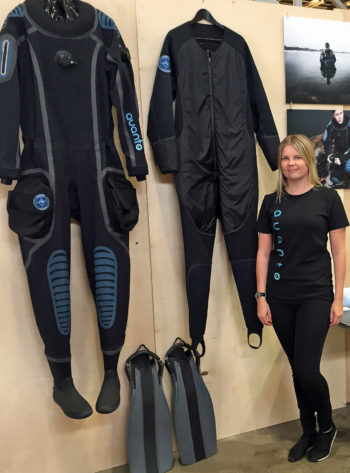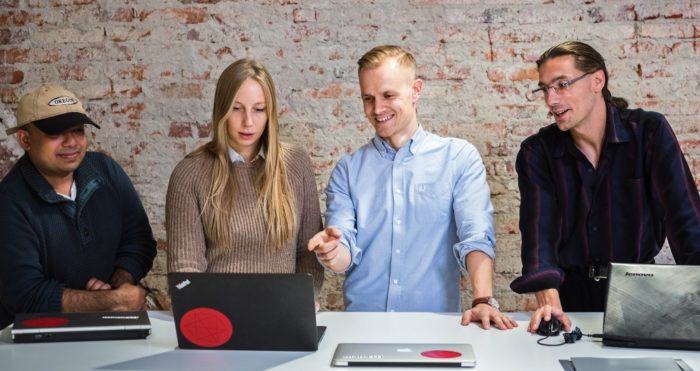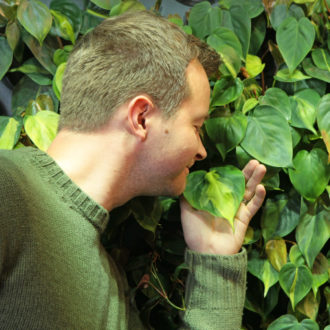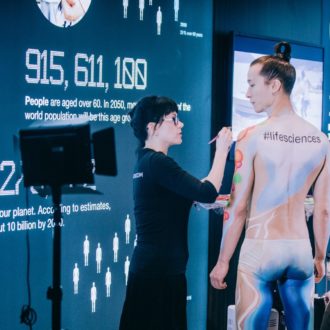Sari Stenfors, executive director of the Augmented Leadership Institute in California, looks upon anyone who wears glasses or uses a smartphone as a potential future cyborg. One day, she believes, we will be able to connect with machines and even other human brains to allow work to become more decentralized as people strive for a state of greater happiness. In her future, personal data will be the most valuable asset you can own or sell.
“How many of you would like to impact your own future, to make it better?” Stenfors asked the audience in an appearance as a keynote speaker at the annual Slush Helsinki event for startup companies and investors, just a few weeks before the end of 2017. “How many of you have taken it upon yourselves to do something about it?”
She added, “It’s up to us to choose which parts we want to adopt. We need to think what features we would like to have more in the future.”
Staying warm is a huge deal

Avanto Technologies’ Aino Aarnio-Juurinen displays some of her heated-clothing creations.Photo: Visa Kupias
Among the other people at Slush, an event attended by thousands of startup entrepreneurs, were two young Finns: Aino Aarnio-Juurinen and Suvi Ellilä. Each represents a new company with big ideas and plans for success.
Aarnio-Juurinen is cofounder and chief tech officer of heated-clothing manufacturer Avanto Technologies (avanto is the Finnish word for a hole cut in the ice on the surface of a lake or the sea for purposes of winter swimming). She designed a scuba-diving suit with an infrared heating system as part of her master’s thesis at Aalto University in the Finnish capital region. Working with business partner Visa Kupias, Aarnio-Juurinen wanted to create user-friendly wearable technology with style. Now Avanto is moving toward making its infrared heating technology available to established companies in the clothing industry.
“We can help people who work in a cold environment, such as construction workers, guards, military personnel or sailors, by bringing adjustable heat to the garment itself,” Aarnio-Juurinen says. “That lessens the need for multiple layers of clothing and improves performance.”
Her small company, which includes the two founders and one employee, aspires to become a market leader in wearable integrated-heating solutions. Avanto Technologies has already caught the attention of some investors, and finished in the top 50 in the Slush 100 Showcase competition for startups.
Clearing contradictory demands

At Selko, Suvi Ellilä (second from left) and her team (from left: Faisal Mokammel, Tuomas Ritola and Vladislav Nenchev) harness artificial intelligence to solve legislative and requirement-data problems in engineering.Photo: Tarmo Pekola
Suvi Ellilä’s Selko, an artificial intelligence (AI) company aiming to solve legislative and requirement-data problems in engineering, finished in the top 10 of the Slush 100 Showcase.
“The [top 10 placement] was better than we expected,” says Ellilä, who joined Selko’s four-person team as chief operating officer in April 2017.
Through artificial intelligence, Selko (a Finnish word that denotes clarity and comprehensibility) helps large engineering companies handle substantial amounts of bureaucratic requirements.
By way of example, Ellilä says that an engineering company working with aircraft, satellites or nuclear power plants could be subject to many regulations. Her company could help engineers sort through the legislative texts and the possibly contradictory demands they contain.
AI could also help businesses maintain safety regulations within budget, possibly saving taxpayer money on publicly funded projects and preventing workplace accidents. Selko wants to use AI for product development and to expand its capabilities into law and healthcare, among other areas.
“It’s up to us how far we can go into teaching the algorithms to pick up peculiarities of different industries,” Ellilä says. “But we have more ideas than time, so we need to make sure to put our efforts in the right place.”
Thinking big and small
Both Ellilä and Avanto Technologies’ Aarnio-Juurinen say they are most intrigued by innovation through nanotechnology – the manipulation of matter on an atomic, molecular, and supramolecular scale that can be used in healthcare, chemistry, biology, engineering and other fields.
“I’m very interested in nanomotors [tiny devices that move things around] in bionanotechnology, where ingenious biological mechanisms are used for nanostructures,” says Ellilä. Thinking on another scale, she says, “I’d also like to use my time more efficiently, so I find the idea of self-driving cars very appealing.”
Aarnio-Juurinen also follows rapidly advancing nanotech and its applications, capable of self-cleaning textiles. However, a clothes designer by trade, she wonders about sustainability and the future of the culture of consumption.
“We don’t necessarily need more useless things in this world, but we can improve the current solutions by ecological thinking,” she says. “For example, clothes could be recycled back into raw materials, or the whole garment industry could be revolutionised by 3D printing.”
By Nina Broström, February 2018







